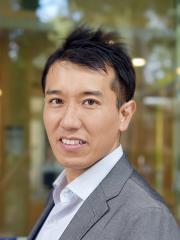
Professor Yamauchi is focussed on design of novel nanocrystals and nanoporous materials toward various applications including batteries, fuel cells, solar cells, chemical sensors, field emitters, and photonic devices. Specifically, nanoporous metals with metallic frameworks can be produced by using surfactant-based synthesis with electrochemical methods. Owing to their metallic frameworks, nanoporous metals with high electroconductivity and high surface areas hold promise for a wide range of electrochemical applications. Furthermore, he has developed several approaches for orientation controls of tubular nanochannels. The macroscopic-scale controls of nanochannels are important for innovative applications such as molecular-scale devices and electrodes with enhanced diffusions of guest species.
Professor Yusuke Yamauchi received his Bachelor degree (2003), Master degree (2004), and Ph.D. (2007) from the Waseda University, Japan. After receiving his Ph.D., he joined the National Institute of Materials Science (NIMS), Japan to start his own research group. He led a big team of senior scientists, technical staffs, and more than 30 PhD students/Postdocs. After getting the ARC Future Fellow, in May 2017 he joined the University of Wollongong as a full professor. Currently, he is a senior group leader at AIBN at University of Queensland. Professor Yamauchi has a joint appointment with the School of Chemical Engineering. He concurrently serves as an honorary group leader of NIMS, a visiting/honorary professor at several universities (University of Wollongong, Tianjin University, King Saud University, and Waseda University), and an associate editor of Journal of Materials Chemistry A published by the Royal Society of Chemistry (RSC).
He has published more than 500 papers in international refereed journals with > 20,000 citations (h-index > 70). He is selected as one of the Highly-Cited Researchers in Chemistry in 2016 and 2017. He has received many outstanding awards, such as the NISTEP Award by National Institute of Science and Technology Policy (2016), the Chemical Society of Japan (CSJ) Award for Young Chemists (2014), the Young Scientists’ Prize of the Commendation for Science and Technology by MEXT (2013), the PCCP Prize by the Royal Society of Chemistry (2013), the Tsukuba Encouragement Prize (2012), the Ceramic Society of Japan (CerSJ) Award (2010), and the Inoue Research Award for Young Scientists (2010).
